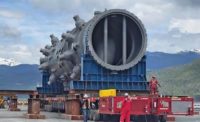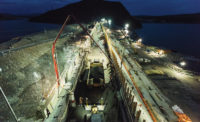Contractors, architects and engineers in Boston and across Massachusetts are heading back to work this week amid the launch of a phased reopening of the area's booming construction sector.
Boston began a phased restart of construction activity May 18, giving the green light to a wider range of essential core projects to move forward, like health care and housing. Projects such as condo towers are slated to restart next week in Boston, with the city having put a stop to all but emergency work in mid-March as coronavirus infections and deaths began to soar.
Massachusetts Gov. Charlie Baker (R) unveiled May 18 his own reopening plans for the state’s economy as well, with construction as well as manufacturing reopening in the first wave.
In preparation for the construction relaunch, contractors, architects and engineers with projects in Boston have spent weeks gathering hard-to-find masks, gloves, face shields and other personal protective equipment, as well as acquiring touchless thermometers, and in some cases, installing infrared cameras.
Industry executives say they have also spent weeks hammering out detailed plans for an array of social distancing and safety protocols aimed at preventing the spread of the virus at construction sites and in offices.
“We are looking forward to opening some jobsites,” says Matthew Consigli, president of Consigli Construction. Most of the company’s work in Boston shut down two months ago.
Consigli says he has no problem with the cautious, step-by-step approach to reopening being taken by Boston Mayor Marty Walsh (D) and Gov. Baker. “It is going to allow us to ramp up work incrementally, rather than us having everybody rush back to the jobsites,” he says.
New Worksite Reality
Daily temperature checks, infrared cameras at construction sites and staggered shifts, as well as masks and hand-washing stations, are all part of the new reality, Consigli says.
The Milford, Mass.-based contractor, which is gearing up to restart a 300,000 sq-ft lab building for Breakthrough Properties and Tishman Speyer in Boston's Seaport District, has distributed touchless thermometers to its workers. The contractor is experimenting with different types of thermal cameras on its jobsites as well.
Like other contractors interviewed by ENR, gloves, safety glasses and masks are now required as well. “We are asking people to use common sense and check their temperature before they come to the site,” Consigli says.
Jim Chambers, vice president for practice management at Boston-based design firm Shepley Bulfinch, noted that sitework is restarting this week on a $1-billion hospital high-rise his firm designed for Boston Children’s Hospital. Chambers says he expects a slow ramp-up, with contractors, operating in compliance with city regulations, looking to keep their workforce spread out, in part by scheduling multiple shifts.
Medical professionals located in a tent by the site are taking the temperatures of workers as they enter, after which they get a colored wristband showing they have been screened.
In another project Chambers' firm is working on at Harvard Medical School, various trades are being brought in at different points to do their work.
While the safety measures are vital, one potential downside is loss of efficiency, Chambers says. Before the outbreak of COVID-19, there were 200 workers on site at any one time. “It will take two weeks, if not a couple of months, to get fully back to the same amount of manpower on the site,” says Chambers of the Children’s project.
A New World at the Office
While Baker’s plan, released May 18, allows offices to start reopening on May 25, Robin Greenleaf, president and founder of Boston-based Architectural Engineers and chair-elect of the American Council of Engineering Cos., says she is not rushing to get employees to return to the firm’s downtown office, having recently sent out surveys to gauge their comfort level.
All but three employees had been using public transportation to commute to their offices before COVID-19, so driving into Boston, already a difficult proposition with scarce parking, and in normal times, fierce traffic, is not necessarily an option, she says.
“People are looking forward to the camaraderie of coming back, but they are pretty uncomfortable how that may work and how to maintain a six-foot distance between people,” Greenleaf says. “I would not anticipate any of our people will be back for anything other than part-time and that would not start for a month.”
Nik Middleton, CEO and founder of Boston-based design firm CUBE 3, also is in no hurry to rush workers back to the office. Middleton says he plans to initially have just half his staff report to work at the company’s offices in Lawrence and Boston, while splitting those groups into smaller segments to further reduce the risk of anyone getting sick. “If anyone contracts the virus, it won’t bring down my entire office,” he says.
Ben Goldfarb, vice president at Nauset Construction, says the company has created two different kitchens in its Needham, Mass., offices, “in order to keep the volume (of foot traffic) down.”
PPE Challenges
One of the biggest challenges in getting ready to reopen is simply lining up the masks, face shields and other personal protective gear needed to reopen safely, industry executives say.
Greenleaf says she has spent weeks scouring Amazon.com for supplies and has yet to come across any cleaning solutions, while Cube 3’s Middleton says sanitizers and wipes have been the hardest nut to crack.
Nauset’s Goldfarb says his firm finally received a shipment of face masks a month after first ordering them. “FEMA stopped the order and took part of it,” he says. “It was unpredictable.”
Faced with a similar problem, Consigli took a different approach, teaming up with a pair of local suppliers. The company found a business in Maine to make face masks designed to be comfortable enough for construction workers to wear.
Consigli teamed up with small distilleries “from D.C. to Maine” that had begun making hand sanitizer amid the crisis.
A team made up of staff from across the company, from carpenters to IT and marketing employees, spent countless hours pouring sanitizer into bottles, ensuring that the company got what it needed while donating the rest.
“We are buying hand sanitizer in bulk and bottling ourselves,” Consigli says. “We went ahead and procured all the necessary PPE before anybody told us to. We got a good jump on it early on.”





